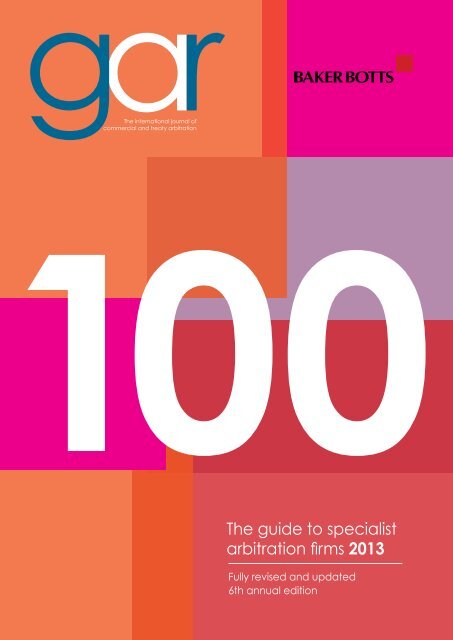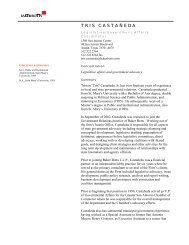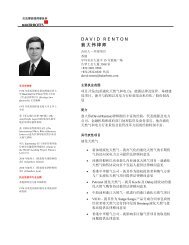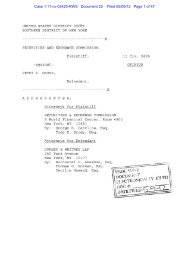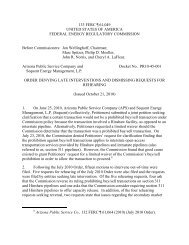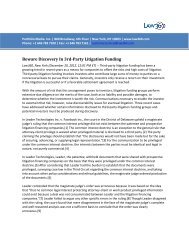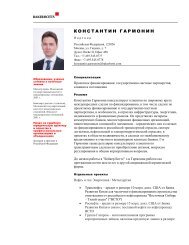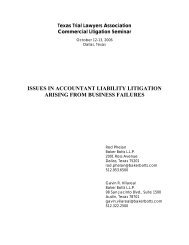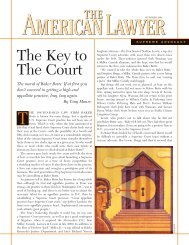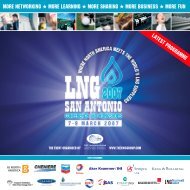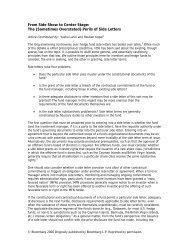GAR - Baker Botts LLP
GAR - Baker Botts LLP
GAR - Baker Botts LLP
You also want an ePaper? Increase the reach of your titles
YUMPU automatically turns print PDFs into web optimized ePapers that Google loves.
These days, many law firms can supply a client with a lawyeror two who has worked most of his or her career in internationalarbitration.And their clients are the better for it. Because, as should be clearby now, international arbitration is all about ringcraft. And whensomeone who has that ringcraft takes on someone who doesn’t, theformer pretty much always has the upper hand.It’s not just because they know how to address the chairman ofthe tribunal (although there is that, and indeed some funny storiesabout arbitrators being addressed as “your excellency” and “yourHoliness” by US plaintiff’s lawyer types).Rather, it’s because at some point they’ll misjudge the occasion.Perhaps when cross-examining they will “come out of the blocks at100 miles per hour against an elderly Swiss professor,” as one sourceremembers seeing. Such a tactic “may be appropriate in a courtroom,but will play badly in front of arbitrators, especially if they are alsoSwiss professors!”Or they may inadvertently prick the curiosity of an arbitrator, say,by suggesting that a topic is off limits; forgetting that arbitrators havebroader powers to go where they wish. Or they may simply comeacross as rather condescending. A lot of lawyers from certain legaltraditions, when dealing with those from others, naturally are.Matthew Weiniger – a partner with Herbert Smith in London(and the visiting professor whose students get the breeze-block/cat-pinch comparison) – recalls being pretty much gifted a case by anaïve opponent.That opponent – a reasonable UK corporate firm (“you’dimmediately know them”) and a QC (“who was brilliant but doinghis first arbitration”) – misconstrued a key procedural order. That ledthem to hand over more documents than they needed to – “the goodand bad documents – everything, including internal client memos.”Weiniger romped through the cross-examination, as the betterprepared. The arbitrator’s order, it so happened, was a fairly standardformulation.Does Weiniger get gifts of that type often? “I’m used to it,” he says.“Usually there are more subtle things.”There may have been a more high-profile example recently. In2011, a joint venture proposal between BP and Rosneft implodedafter BP lost an arbitration. It was noted by the cognoscenti inLondon that BP’s chosen law firm isn’t super-famous for internationalarbitration; whereas the opponent’s was.In the end, there’s no escaping the old adage, “know your judge”– or its even more important other half, “make sure your judgeknows you”. The longer any advocate spends in the presence of theiradjudicators, the better they will tend to do. The advantage arises fortwo reasons: improved intuition and the fact that the advocate arrivesin front of them with personal capital.“QCs, in the High Court, are brilliant because they know thosepanels inside out and that style of advocacy,” according to Londoninternational arbitration specialist, who asked to speak on conditionof anonymity so he could be fully frank.“Laurence Rabinowitz QC [a well-known UK advocate forcommercial cases from One Essex Court] can appear before any judgeand they know him: ‘Ah, Mr Rabinowitz – very interesting and niceto see you!’ The same thing applies in international arbitration. Forexample, I’ve got a case right now in front of [a leading internationalarbitrator]. Every time I go to a conference, he’s there ... we read eachother’s books. My opponent, in comparison ... he hasn’t got a clue.“If you take all the partners in our group,” the source adds, “thenwe’ve appeared before every single arbitrator worth knowing. Notjust once, but multiple times in the past few years. We have the insideknowledge as a result of that. So that means, if I pick up the phone to[names a leading arbitrator] because I want to appoint them, I knowthey’re going to phone back.“QCs in the high court are brilliant, because what they have isringcraft. But when it comes to international arbitration, I have theringcraft.”Another specialist confirms this view. He says he wishes moreof his opponents were international arbitration purists because it ismore efficient. “I would love to do more cases against Freshfields,” thissource says. “I tell clients: If this were against Freshfields, I’d get you adeal in two days. It would be over. But because we’ve got these idiotswe’re probably going to have to fight for years.”Sophisticated clients, as it happens, get this. They see the valueof specialist international arbitration counsel. A survey* publishedin 2006 found that three-quarters of in-house counsel intervieweeswould seek a lawyer they regarded as an international arbitrationadvocate rather than a litigator. (They defined specialisation as a mixof reputation, amount of work undertaken and experience. In theinterim, more law firms have caught religion and created their owninternational arbitration groups.)So the challenge now is finding those specialist counsel.The book you are holding may help. Six years ago, GlobalArbitration Review conceived the <strong>GAR</strong> 100 as vehicle to identify atleast 100 firms one can consider “approved” in this discipline. To gaininclusion, a firm would have to open its books to our researchersand allow us “audit” exactly what they’d been up to. Broadly, we’veused the criteria identified in that survey: reputation; amount of workundertaken; and experience.With this edition – our sixth – the number of approved firmsis 151, and more countries than ever are covered (at least 40). We’veadded 16 new firms since the last edition. Once again, it’s a mix oflarge and small practices – sometimes as small as one person (if thatperson is sufficiently well-known).As well as adding new firms, we’ve continued to improve ourdescriptions of firms. Many now include extra sections outlining thehistory of the practice – and in particular (where information couldbe obtained) its lineage (ie, connection with key figures of the past).Similarly, we set increasing store by a track record of success(while recognising that success is a relative concept – a “win” canbe a loss and a “loss” can be win.) It’s not unreasonable to expectan arbitration group to win, from time to time, as it goes about itsgeneral work.The research period for all data in the book is 1 August 2010 to1 August 2012. All the other information is correct as of 1 Januarythis year.The editorial team is enormously grateful to the firms whoresponded to this year’s request for current information. We’realso grateful to various colleagues within Law Business Research –particularly Tom Barnes and Nina Nowak from Who’s Who Legal – fortheir contribution. On a personal note, I’d like to thank the manyinternational arbitration lawyers – young and old – who have takentime over the years to explain the nuances of their craft to me. I alsoowe a big thank you to the rest of the <strong>GAR</strong> writing team who haveto fit writing this in with their other reporting, and features editorSebastian Perry for organising the whole process.David SamuelsJanuary 2013* International Arbitration: a study into corporate attitudes, by PricewaterhouseCoopersand the School of International Arbitration, London.Global Arbitration Review 5
<strong>Baker</strong> <strong>Botts</strong>People in Who’s Who: 5Pending cases as counsel: 18Value of pending counsel work:US$125 billion (includingYukos claim of US$114 billion)Treaty cases: 3Current arbitrator appointments:6 (1 as sole or chair)No. of lawyers sitting as arbitrator: 5The firm scored a win for Ecuador and was kept busy byRussiaInitially a pre-eminent firm in oil and gas, <strong>Baker</strong> <strong>Botts</strong> had nodedicated stand-alone arbitration group until 2001, although many ofits trial lawyer partners had handled international arbitrations. Sincelaunching a stand-alone practice, the firm has established itself as aname that pops up regularly on some of the world’s highest-valuearbitrations. One matter – against Yemen – was the most valuable ICCdispute of its day. More recently, Russia asked it to be the strategiccoordinator for all Yukos-related arbitrations.Since 2010, the group has been co-chaired by Jay Alexander inLondon and Michael Goldberg in Houston.The team prides itself in being one of the more collegial inapproach and less ego-affected than some.NetworkLondon is the most important office for the arbitration group – hometo partners who specialise in the field from both civil and commonlaw backgrounds. But the team also spans Houston; Washington, DC;and Dubai.Who uses it?Russia, as mentioned: it has asked <strong>Baker</strong> <strong>Botts</strong> to partner with longtimeadviser Cleary Gottlieb as “strategic coordinator” for all disputesconnected with Yukos.Beyond that, Rosneft and Gazprom and a number of leadinglocal financial institutions (including Troika Dialog, VTB Capital andRenaissance Capital) have all instructed it.So have ExxonMobil, Total and Hunt Oil Company, Rio Tintoand PT Bumi Resources from the world of natural resources, not tomention Kia Motors Corporation, Saudi Basic Industries Corporation– a leading chemicals manufacturer – and Chinese telecoms companyHuawei Technologies.The US’ Lone Star Funds and the Korea Exchange Bank used it foran arbitration with Olympus Capital that ended in late 2011.The team was also adviser to hotel group Helnan InternationalHotels in a noteworthy battle with Egypt at ICSID.The team is also now representing the Republic of Ecuador in aseries of disputes.Track recordAn early win was US$200 million for Kia Motors in one of the largestICC Latin-American arbitrations of its day. A big claim against Kia wassimultaneously dismissed.In the case against Yemen (for Hunt Oil and ExxonMobil) <strong>Baker</strong><strong>Botts</strong> won costs, damages and dismissal of an US$8 billion counterclaim.More recently, it has extricated Huawei Technologies from a majorcontract for the price of US$2 million and won two energy companiesUS$100million in a row about a cogeneration plant.Recent eventsThings have been quiet on the personnel side since 2010 – whenDominic Pellew (former head of the dispute resolution practice atLovells CIS) arrived to help develop Russian work, and Chileanarbitration specialist and former ICSID counsel Alejandro Escobar waspromoted to partner.But 2012 did see the arrival of Ravinder Bhullar – a constructionspecialist – as special counsel in Dubai and the departure of Jun Bautistain Hong Kong.It also saw Michael Goldberg meet a number of presidents andprime ministers around the world, and the group as a whole take partin a number of fast-tracked arbitrations.Ania Farren continues to be a driving force behind London’sInternational Arbitration Charity Ball.On the case front, 2012 saw the firm help Ecuador defeat a US$56million treaty claim filed by Ulysseas, an electricity company ownedby US hedge fund manager Elliott Associates – as well as win US$2million in costs.Yukos-related matters also kept the team busy. The EnergyCharter Treaty claim brought by the defunct oil company’s majorityshareholders saw merits hearings over five weeks from November.However, a parallel treaty claim by Spanish investment funds witha minority stake in Yukos ended in mid-2012 with a ruling against<strong>Baker</strong> <strong>Botts</strong>’ client. A panel chaired by Jan Paulsson held Russia liablefor expropriation and ordered it to pay US$2 million.Client commentCristel Gaibor, director of international affairs for Ecuador’s attorneygeneral’s office, vouches for <strong>Baker</strong> <strong>Botts</strong>, particularly in light of their“remarkable” work on the Ulysseas case (described above). She paidtribute to the “leadership” and “extensive knowledge” of AlejandroEscobar, and his team’s “mastery of the Spanish language”.Meanwhile, Paul Wright, a coordinator of international disputesand special projects at ExxonMobil, said the team has the ability to“dig deep” and “will often find the golden nugget that makes all thedifference between winning and losing”.22www.globalarbitrationreview.com
RankFirmNo. in Who’sWho LegalPending cases(as arbitrator)Merits hearingscompleted in two yearsJurisdictional hearingscompleted in two yearsBet-the-companyhearingsPending cases as counsel1 (1) FRESHFIELDS BRUCKHAUS DERINGER 15 69 57 3 8 280 802 (2) WHITE & CASE 14 49 51 14 7 223 733 (3) SHEARMAN & STERLING 5 21 31‡ 11 85 155*4 (4) KING & SPALDING 12 36 24 3 3 61 475 (5) WILMER CUTLER PICKERING HALE & DORR 5 51 8 16 2 81 846 (11) SKADDEN ARPS SLATE MEAGHER & FLOM 5 11 15 4 5 48 587 (14) CURTIS MALLET-PREVOST COLT & MOSLE 3 7 8 6 6 57 1208 (10) HERBERT SMITH 10 23 34 9 1 82 259 (7) DEBEVOISE & PLIMPTON 6 20 8 2 3 53 4910 (8) HOGAN LOVELLS 1 20 44 13 2 96 37.311 (21) DECHERT 4 64 17 12 2 48 UnknownValue of current portfolioas counsel (US$ billion)12 (12) ALLEN & OVERY 6 36 22 2 0 101 “Several billion dollars”13 (6) CLIFFORD CHANCE 6 31 60 8 1 150 3514 (-) COVINGTON & BURLING 4 16 14‡ 3 23 1515 (19) NORTON ROSE FULBRIGHT 10 45 49 6 2 258 3816 (13) LALIVE 7 69 11 0 1 48 250†17 (30) BAKER BOTTS 5 6 12 N/A 2 18 125*18 (-) CLEARY GOTTLIEB STEEN & HAMILTON 1 13 14 2 1 63 120*20 (19) SCHELLENBERG WITTMER 5 61 11 1 0 28 420 (15) DLA PIPER 3 24 33 4 2 121 64.421 (-) ARNOLD & PORTER 2 10 13 0 1 21 1022 (22) MANNHEIMER SWARTLING 3 19 20 5 1 68 3123 (9) BAKER & MCKENZIE 6 43 48 5 1 220 4524 (16) CMS 2 71 57 6 0 85 2125 (17) CLYDE & CO 1 29 66 5 1 500§ 2526 (-) DE BRAUW BLACKSTONE WESTBROEK 0 0 17 0 2 30 6.527 (-) WEIL GOTSHAL & MANGES 3 8 16 7 0 40 728 (-) FOLEY HOAG 2 4 7 5 2 31 5929 (-) WONGPARTNERSHIP 1 20 12 2 0 40 4.530 (-) SQUIRE SANDERS 1 10 11 N/A 2 27 13Footnotes* includes the Yukos claim of US$114 billion† includes one state-state matter valued at “hundreds of billions”‡ includes jurisdictional hearingsgar§ includes maritime and commodities work146 www.globalarbitrationreview.com Global Arbitration Review 147


